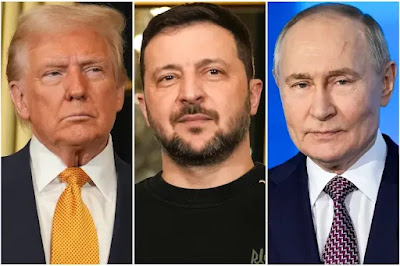The global diplomatic stage is abuzz with critical developments as leaders convene and tensions simmer. At the heart of recent events, Ukrainian President Volodymyr Zelenskyy and US President Donald Trump held a pivotal meeting on the sidelines of the NATO summit in The Hague, while Russian President Vladimir Putin’s notable absence from the upcoming BRICS summit in Brazil signals continuing international isolation.
A Crucial Handshake: Zelenskyy and Trump at NATO
In a highly anticipated encounter, Ukrainian President Volodymyr Zelenskyy met with US President Donald Trump during the NATO summit. With the war in Ukraine now stretching into its fourth grueling year, the discussions focused on vital issues: sanctions against Russia and the procurement of much-needed arms for Ukraine's defense. Zelenskyy underscored his unwavering commitment to achieving "real peace" and ensuring the protection of his people. Trump, for his part, indicated his intention to engage with Russian President Vladimir Putin to explore avenues for ending the conflict, acknowledging the possibility of Putin harboring territorial ambitions beyond Ukraine's current borders. This meeting highlights the intricate dance of international diplomacy amidst ongoing conflict.
Putin's Absence: The Shadow of an Arrest Warrant
A significant diplomatic ripple is Vladimir Putin's decision to forgo the upcoming BRICS summit in Brazil. The reason? An International Criminal Court (ICC) arrest warrant, issued in 2023, which accuses Putin of war crimes, specifically the deportation of Ukrainian children—an allegation vehemently denied by Moscow. Putin has consistently avoided traveling to nations that are signatories to the ICC treaty, meticulously sidestepping potential arrest. This precautionary measure follows a previous incident where Mongolia, an ICC member, did not act on the warrant during his visit, yet the threat persists in other jurisdictions. His absence from such a high-profile international gathering underscores the tangible impact of the warrant on his global mobility and standing.
Ukraine War Rages On, NATO Rises to the Challenge
Beyond the diplomatic exchanges, the grim reality of the Russia-Ukraine war continues to unfold. Recent reports detail devastating missile strikes by Russia on Ukrainian cities, resulting in tragic casualties and widespread damage. The conflict's relentless nature has prompted strong reactions from NATO. Secretary-General Mark Rutte openly expressed his deep distrust of Putin, noting that Russia's rearmament efforts are actively challenging NATO's long-held military edge. In a decisive move, NATO members have endorsed a significantly higher defense spending goal, aiming for five percent of GDP by 2035. This ambitious target, strongly supported by President Trump and driven by escalating European security concerns, signals a robust commitment to collective defense. Meanwhile, efforts to normalize US-Russia relations remain stalled, overshadowed by the ongoing conflict and its complex geopolitical ramifications.
The coming months will undoubtedly test the resilience of diplomatic efforts and the resolve of international alliances as the world grapples with these multifaceted challenges.






0 Comments
Please do not enter any spam link in the comment box.